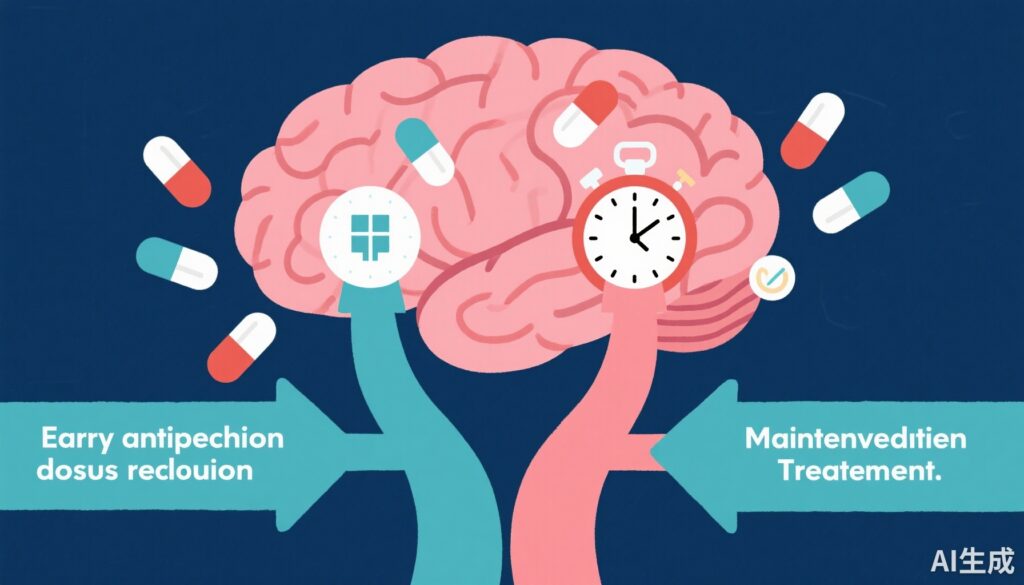Highlight
– Early dose reduction or discontinuation (DRD) within 12 months after remission from first-episode psychosis (FEP) significantly increases short-term relapse risk and lowers quality of life.
– No significant difference was found in patient-rated functioning (WHODAS-2) between DRD and maintenance over 4 years.
– At 3 and 4 years, DRD patients demonstrated better researcher-rated global functioning (GAF) and a trend toward improved symptom severity.
– Similar rates of serious adverse events were observed in both groups, but suicide deaths were numerically higher in the DRD group.
Study Background and Disease Burden
First-episode psychosis (FEP) represents a critical stage in the trajectory of schizophrenia spectrum and related psychotic disorders. Conventional clinical guidelines advocate continuation of antipsychotic medication after remission to minimize relapse risk, given that relapse is strongly associated with poor prognosis, social dysfunction, and increased mortality. However, long-term use of antipsychotics also carries risks of adverse effects including metabolic disturbances, neurological side effects, and possible reduction in brain volume.
Controversy exists about whether early dose reduction or discontinuation (DRD) of antipsychotics may foster better functional outcomes through reduced side effects and enhanced psychosocial recovery. Previous long-term studies have produced conflicting results, and the weighing of early relapse risk against potential long-term functional benefits remains unresolved. Thus, well-powered, pragmatic randomized controlled trials examining both short- and long-term outcomes are essential to inform clinical decision-making.
Study Design
The Handling Antipsychotic Medication Long-Term Evaluation of Targeted Treatment (HAMLETT) study was a pragmatic, single-blind randomized clinical trial (1:1 allocation) conducted across 26 specialized psychosis units in the Netherlands from September 2017 to March 2023. Eligible participants were patients who had achieved remission after a first episode of psychosis, recruited from both inpatient and outpatient services.
Participants were randomized to either early dose reduction or discontinuation (DRD) initiated within 12 months post-remission or to maintenance antipsychotic treatment for 12 months. The study followed participants for up to four years after randomization.
The primary outcome was patient-rated functioning assessed with the World Health Organization Disability Assessment Schedule 2.0 (WHODAS-2). Secondary outcomes included researcher-rated global assessment of functioning (GAF), quality of life metrics, relapse occurrence, symptom severity measured by the Positive and Negative Syndrome Scale (PANSS), as well as safety outcomes such as serious adverse events (SAEs) and adverse effects.
Key Findings
A total of 347 patients were included (69.5% male; mean age 27.9 years). Of these, 168 were allocated to the DRD group and 179 to maintenance treatment.
Primary Outcome – Patient-Rated Functioning: WHODAS-2 scores showed no significant interaction between time and treatment condition, indicating no difference in patient-perceived disability/functioning over the four-year follow-up period between DRD and maintenance groups.
Relapse and Quality of Life in Year 1: Early DRD was associated with a significantly increased risk of relapse within the first year (OR 2.84; 95% CI, 1.08–7.66; P = .04). Additionally, patients in the DRD arm reported lower quality of life during this period (β = -3.31; 95% CI, -6.34 to -0.29; P = .03), underscoring short-term vulnerabilities.
Long-term Functioning and Symptoms at Years 3 and 4: A nonlinear time effect emerged whereby DRD participants showed significantly higher GAF scores at years 3 (β = 3.61; 95% CI, 0.28–6.95; P = .03) and 4 (β = 6.13; 95% CI, 2.03–10.22; P = .003) compared with maintenance. A trend toward reduced PANSS symptom severity was also noted at year 4 (P for trend = .06), suggesting some benefit in symptom control and functional recovery.
Safety and Adverse Events: Rates of serious adverse events and general adverse effects were comparable between groups overall. However, there were three confirmed deaths by suicide in the DRD group, compared to one in the maintenance cohort. While numbers are small, this finding emphasizes the need for careful patient monitoring.
Medication Dose Equivalence Post Year 1: From one year onward, antipsychotic medication doses did not differ significantly between the groups, indicating that the observed long-term functional benefit in DRD patients was unlikely due simply to medication dosing differences. The authors hypothesize that DRD may offer a learning experience facilitating better management of psychotic vulnerability, potentially empowering patients in medication use decisions.
Expert Commentary
The HAMLETT trial provides important pragmatic data addressing a vexing clinical dilemma: balancing relapse risk against functional recovery in FEP management. Its findings substantiate the prevailing caution that early antipsychotic dose reduction substantially elevates short-term relapse risk, reinforcing guideline recommendations for maintenance treatment post-remission.
Yet, the demonstration of improved researcher-rated functioning and symptom trends at later time points introduces complexity, suggesting that strategic, carefully supervised DRD may confer functional advantages over the long term.
However, the increased suicide deaths in the DRD arm, while limited by small numbers, demand vigilance in clinical application. This underscores the necessity of individualized risk stratification, comprehensive psychosocial support, and stringent relapse monitoring if dose reduction is considered.
Limitations include the single-blind design, which may introduce expectancy bias, and the larger male representation, which might affect generalizability. Future work should investigate predictors of successful DRD and integrate patient preferences and psychosocial interventions to optimize outcomes.
Conclusion
The HAMLETT randomized clinical trial clarifies that early dose reduction or discontinuation of antipsychotics after first-episode psychosis remission increases short-term relapse risk and reduces quality of life within the first year. However, over 3 to 4 years, such a strategy may yield better researcher-rated global functioning and a trend toward improved symptom control, despite equivalent medication doses from year 1 onward.
These data highlight the clinical imperative to carefully weigh the short-term risks of relapse and adverse outcomes against potential long-term functional benefits. Early antipsychotic discontinuation may represent a complex, patient-empowering process rather than a simple lowering of medication, necessitating individualized clinical judgment, structured support, and monitoring.
Overall, this study informs ongoing debates and guidelines on antipsychotic management post-FEP, supporting a nuanced approach that prioritizes safety without precluding long-term recovery potential.
References
Sommer IE, de Beer F, Gangadin S, de Haan L, Veling W, van Beveren N, Boonstra N, Rosema BS, van Os J, Kikkert M, Koops S, Noorman J, Thielen F, Wijnen B, Begemann M; HAMLETT-OPHELIA Consortium. Early Dose Reduction or Discontinuation vs Maintenance Antipsychotics After First Psychotic Episode Remission: A Randomized Clinical Trial. JAMA Psychiatry. 2025 Oct 1. doi:10.1001/jamapsychiatry.2025.2525. Epub ahead of print. PMID: 41032294.
Leucht S, Tardy M, Komossa K, et al. Maintenance treatment with antipsychotic drugs for schizophrenia: meta-analysis of randomized controlled trials. Schizophr Bull. 2012;38(5): 1059–1072. doi:10.1093/schbul/sbs055.
Kane JM, Leucht S, Carpenter D. The Expert Consensus Guideline Series: Treatment of Schizophrenia. J Clin Psychiatry. 2003;64 Suppl 12:3-80.



